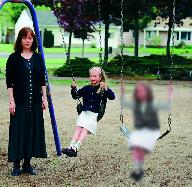Imaginary Friend
The term imaginary friend ordinarily refers to such characters created by children, but the same phenomenon is observable in adults. The inventor will act as if the imaginary being is physically present by talking to it, playing with it, or even attempting to feed it. If told that the friend is non-existent, the inventor will often retaliate in a defensive manner by stating that the imaginary friend is invisible, or in some cases questioning the vision of the person.
People may invent imaginary friends for companionship, as part of play, or for other reasons. Imaginary friends can serve as an important source of companionship to some children and adults. As an example, clinical psychologists have reported that young children in boarding schools often develop imaginary friends to cope with extreme stress and separation from their family. According to some psychological theories, children often use their imaginary friends as outlets for expressing desires which they would normally be afraid to engage in or for which they would normally be punished. Proponents of these theories state that it is not uncommon for a child to engage in mischief or wrong-doing and then to blame the crime on their imaginary friend, allowing the child to act out fantasies that they are otherwise restricted from experiencing due to societal constraints. Similarly, psychologists report that children often give their imaginary friends personality traits that they themselves lack and make their imaginary friends into ideal versions of themselves: shy children often describe their imaginary friends as playful and outgoing jokesters who are always making them laugh and who are very popular. A long-time popular misconception holds that most children dismiss or forget the imaginary friend once they begin school and acquire 'real' friends. Some psychologists have suggested that children simply retain but stop speaking about imaginary friends, due to adult expectations and peer pressure. Some children report creating or maintaining imaginary friends as preteens or teenagers, and a very few adults report having imaginary friends
 bluebird123 |
Latest page update: made by bluebird123 , May 5 2008, 11:15 AM EDT |
|
Keyword tags:
More Info:
|

